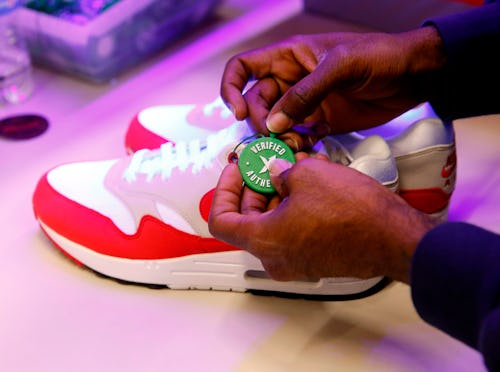
Nike’s lawsuit against StockX has escalated far beyond its initial issue over the intellectual property rights of sneaker NFTs. The sneaker giant has since accused StockX of selling counterfeit Nike sneakers, prompting the reselling platform to hit back.
In response to Nike’s claims, StockX defended its anti-counterfeiting measures, even noting that Nike itself had previously praised the company. A previous statement from StockX called Nike’s claims “baseless,” adding that “[Nike’s] own brand protection team has communicated confidence in our authentication program, and that hundreds of Nike employees — including current senior executives — use StockX to buy and sell products.” The sneaker brand has also “sought to collaborate” with StockX, according to an updated statement.
“Lacking merit” —
The brands’ legal battle began in February when Nike filed a trademark infringement lawsuit against StockX because of the defendant’s sale of “Vault” sneaker NFTs. Each of the digital collectibles was tied to a real-life version of the sneaker it depicted, with an overwhelming amount of the available pairs — eight out of nine — featuring Nike’s Swoosh. In response, Nike accused StockX of “blatantly freeriding, almost exclusively, on the back of Nike’s famous trademarks and associated goodwill.”

Last month, the sneaker company took it a step further when it added claims of counterfeiting and false advertisement to its ongoing lawsuit against StockX. Nike said it purchased four pairs of fake sneakers through the resale platform — despite StockX’s “100 percent authentic” guarantee — and that one of the pairs matched a StockX NFT.
According to Nike, the counterfeit shoes were bought through the resale site between December and February, just before the sneaker brand filed its initial lawsuit against the company. StockX has since questioned why Nike waited until May to include its claims about the fake sneakers. “Nike’s recent allegations lack merit, demonstrate a lack of understanding of the modern marketplace, and display anticompetitive behavior that will stifle the secondary market and hurt consumers,” said StockX CEO Scott Cutler in a statement. The sneaker brand, according to Cutler, “seeks to undermine StockX’s business model.”

The real deal? —
It’s worth noting Nike has started its own journey into the metaverse and NFTs, and as one of the largest sneaker brands out there, certainly has an interest in capitalizing on virtual sneakers. Still, Nike isn’t alone in its complaints against StockX; shoppers have previously complained about receiving counterfeit sneakers or worn or damaged pairs from the reselling platform.
StockX claims in its draft response that its authenticators have inspected more than 30 million products and prevented $60 million worth of counterfeit sneakers from getting to buyers. The company also acknowledged the possibility that fake products could slip past its vetting process, however, noting that it has a refund policy “for the rare case where a counterfeit product might find its way into a consumer’s hands.” That statement alone “undercuts any allegation that StockX is knowingly or intentionally dealing in such goods,” the filing concludes.







